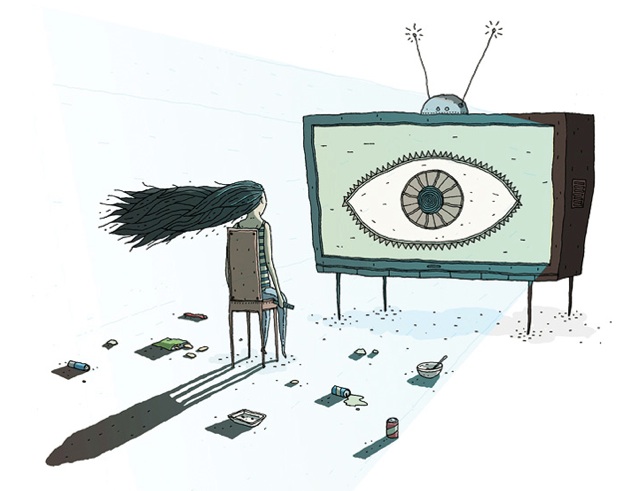Binging Isn’t Quite the Word
 I’ve been searching for a word to capture my new viewing habit. Though “binging” and the somewhat less pathologized “marathoning” have emerged to describe the behavior of consuming many episodes of a series in rapid succession, contemporary control and distribution technologies also allow a distinct, but not so rapid form of consumption. This behavior is distinct enough to warrant its own term, though I continue to struggle to find it.
I’ve been searching for a word to capture my new viewing habit. Though “binging” and the somewhat less pathologized “marathoning” have emerged to describe the behavior of consuming many episodes of a series in rapid succession, contemporary control and distribution technologies also allow a distinct, but not so rapid form of consumption. This behavior is distinct enough to warrant its own term, though I continue to struggle to find it.
For the better part of the last year I’ve experimented with viewing series by season. Either I work my way through something on Netflix or VOD or wait for a season’s worth of episodes to build up on my DVR. I distinguish this from binging because so much of the binging discourse is about the can’t-stop, watched-a-whole-season-in two-days possibility for viewing. When life is busy, I may watch no more than five hours a week, and I don’t always watch whatever it is I’m working through. Binging is hardly the word to describe a month long trek through season two of House of Cards.
The terms I’ve played with so far are “serial viewing” and “reading television”—both of which have obvious problems. The latter comes from my sense that this strategy allows me to consume television series much as I would a book. I might get through an episode (chapter) a night, and sometimes start into a second. I could also pick up the series on a portable device while waiting for a doctor in the way I used to take a book with me (though in truth, I usually prefer to squeeze in actual reading in these times). And, like when reading a novel, I might interrupt the story depending on my entertainment needs or desires. Maybe I’m too burnt out to continue The Bridge tonight; instead I might pull an episode of The Mindy Project from the DVR in the same way I might choose the lesser commitment of magazine reading to that of a novel.
My concern with “serial viewing” is the connection with a narrative form—serial viewing need not be of serial television (though mine typically is). “Consecutive viewing”—meh, though accurate and without baggage. I could make the distinction that I am “watching the last season of Damages right now,” which, in this context might make the distinctive nature of this viewing clear, but the historic casualness of our explanation of viewing behavior really doesn’t convey the distinct behavior.
 Why does this really matter? First, the blanket use of binging for the kind of non-linear viewing I’m describing obscures important insight about how and why viewers are adopting new behaviors, and it discourages reconsideration of the business models that make it far more difficult to view in this way than it needs to be. Traditional aggregators (linear networks and channels) may think “that’s not how our business model works” if they believe binging is all about quick consumption as opposed to something like the greater richness of the narrative experience available when you can actually remember the nuances of what has happened before in the story.
Why does this really matter? First, the blanket use of binging for the kind of non-linear viewing I’m describing obscures important insight about how and why viewers are adopting new behaviors, and it discourages reconsideration of the business models that make it far more difficult to view in this way than it needs to be. Traditional aggregators (linear networks and channels) may think “that’s not how our business model works” if they believe binging is all about quick consumption as opposed to something like the greater richness of the narrative experience available when you can actually remember the nuances of what has happened before in the story.
At this point, the evolution of US television is largely stalled by the disparity between post-network era technologies and distribution systems and the persistence of a network era economic model. DVD release first enabled this mode of viewing, though Netflix made it significantly easier and taught us about queues and consecutive viewing. Other subscription services (HBO Go) subsequently enabled more consumption in this way, and ad-based nets/MVPDs allow a limited (far inferior) version of this with VOD. But the basic economic structure of US television, in which the original licensor pays the bulk of creative costs while the studio retains ownership for sales in subsequent markets, forces viewers to choose between waiting for weekly installments or waiting for availability in secondary markets. Though clinging to the known and profitable business models as long as possible, the scale of coming change is apparent to the executive corps. Better understanding what changing viewing behaviors are about, and why and how different content and different content experiences are valued will be the difference between the survivors of the coming change and those left behind. Which is a long way of saying, we need a word in addition to binging to describe emerging viewing behaviors.



I’ve been tossing around something like “drop-in viewing,” but that’s a little too clumsy. It also implies going to a physical space when you can theoretically watch anywhere. I’ll usually watch two or three episodes of Scandal or West Wing (part of a current research project)while my toddler is napping or sleeping for the night or find other solitary moments in my office occasionally to watch. I might not return to a show for two or three weeks depending on my schedule, so it’s hardly binging, but I usually remain engaged with the nuances of the show, even if it means rewatching a few scenes.
Netflix’s attempts to define these categories of watching a few years ago (with their Flixie awards) came off as both haphazard and oddly prescient in that it pointed out that there were some diverse viewing practices that need definition, even while offering some of the shallowest and most stereotypical language possible for defining them. But I agree that there are some important definitional questions here.
The general point about the underacknowledged diversity of viewing systems is fascinating. The linearity (of schedules, of distribution windows, of the development calendar, etc.) of the old TV model was taken for granted for so long that it’s still difficult (almost a decade into online VOD and SVOD) to conceive of viewing outside that logic. Even “bingeing” and “marathoning” suggest linearity.
Like all parents, my viewing time is also very limited. On weekdays, it’s roughly 90 minutes a night, but that’s only if I don’t have more pressing things to attend to, or would rather do something else (usually reading). We do still have standing appointments for The Good Wife and Doctor Who on their respective broadcast nights, but other than that, it’s whatever we’re up for from our meager DVR queue, Amazon, Hulu, or Netflix.
As a result, I’ve started many shows and have only had time to notch up another episode on rare occasions. My attempts to rewatch classic Doctor Who and Star Trek are laughably sporadic; months can go by between episodes. I still haven’t seen the last three seasons of Breaking Bad, anything past season one of Fringe, or the last season of The Sopranos, come to think of it. My wife suggested a statute of limitations on shows like this (i.e., letting some shows off the “to-do” list for good), but I’m too much of a completionist for particular shows to let them go completely.
So, like you and Chuck, I’m not sure what to call it exactly, other than perhaps “library” viewing: on the shelf, ready to be picked up and viewed, and then put back on the shelf.
Good points, all! I like “library viewing”!
Will be interesting to see if the industry develops terminology that acknowledges audience schedule control. The industry is having a hard time adjusting to its declining control (the insistence that “windows” are necessary, for example). The negative connotations of “binging” (sounds “out of control”) may say more about industry attitudes toward audiences than actual audience behavior!
Like the previous commenters, I’m also in a position of limited time (about an hour a day to watch tv after the kids are finally in bed), but my wife and I are slowly working our way through the entirety of ER. While admittedly lo-fi (we’re watching DVDs) there is something to be said about dropping in and out of a show – particularly as the daily watching of people dying in the ER can be downright depressing at times. I also wonder if Marathon-ing is the more apt term – particularly as the show has a total of 331 episodes, which is not quite the same goal as sitting down to stream Freaks and Geeks, for instance. All of which is to say that “library viewing” has a better ring to it.
Thanks to all for your suggestions and for affirming I’m not alone in this viewing practice. My problem with “library viewing” as a term is that it sounds like an institutional term (content is distinguished as coming from a library window), when this is a viewing behavior distinction. Indeed, right now, most consecutive viewing is done on content in at least its second window (with the exception of Netflix’ few originals), and the term that is emerging for SVOD purchase is “library.” I suspect it won’t be all that long until we see greater disruption in financing practices that prioritize a first linear window and that the “second tier/window” nature of the word library seems an odd descriptor. Does library hold up in the case of first window viewing?
What about “self-scheduled viewing”? To me, that highlights the agency of viewers (which is crucial these practices) but not the rushing timing of the binge (which I too cannot muster).
In COMPLEX TV, I suggest a distinction between “serial aesthetic,” where the gaps between episodes are externally mandated (like with a broadcast schedule), and a “boxed aesthetic,” where the bound volume or DVD set compiles the installments and transforms the ephemeral schedule into a material object to live on your shelf or in a library, and access on your own terms (building on Derek’s work on flow vs. publishing). That materiality connects to the metaphors of “reading” and “library” suggested above, but I don’t claim that “boxed viewing” or “bound viewing” is useful enough to escape their relative connotations of confinement!
I was hoping you’d chime in Jason, and had the feeling that you would anticipate this somewhere in Complex TV. I like the idea of a term like self-scheduled viewing being distinct from a serial or boxed aesthetic as a way to emphasize the textual features that encourage certain behaviors, but the fact that audiences will still watch in personally-driven ways.
[…] allem DVD, VoD) und damit das Phänomen des binge-watching (ein durchaus streitbarer Begriff, wie Amanda Lotz jüngst geschrieben hat) nicht zu vernachlässigende Rückwirkungen auf Produktions-prozesse – […]